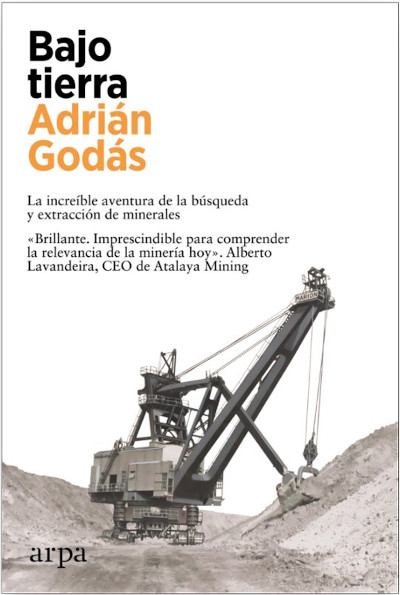In the picture
Cover of the book by Adrián Godás 'Underground. La increíble aventura de la búsqueda y extracción de minerales' (Barcelona: Arpa, 2024) 301 pp.
It is possible that perhaps because it often operates underground and its activity is not seen in large conurbations, and at the same time because it is a coarse industry due to the products it handles, mining tends to be considered as something marginal and surmountable. The importance of oil in the last century is recognized, but the equally nuclear importance of mining in the impressive development known to mankind in the same period (and of course before) is often overlooked. In any case, these activities that today seem to us so opposed to the exalted natural environment are often scorned, when we aspire to a world without polluting and sustainable emissions.
Underground' reveals to the general public the importance for our lives of an economic sector on which so many things in our daily lives depend. Without going any further, the green transition itself is not possible without obtaining so many elements, such as lithium or coltan, while sometimes new solutions that avoid coal are more polluting than traditional processes that have actually been purifying and progressively reducing their carbon footprint.
Adrián Godás is not a defender of the mining industry at any price, nor is he a climate change denier. He does, however, defend an activity that is as legal as many others, and which is also vital for progress. Specializing in a sector that certainly moves a lot of money -from entrance, prospecting and exploitation of large deposits require a very high investment-, Godás sample a great knowledge of this field, with a direct experience that shows in many moments of the book. Constituted in consultant, with his own signature , this young Galician moves us from one side of the globe to the other, relating cases of success and failure, good and bad practices, and introducing us to heroes and villains.
Half of the book evokes mining histories of the past -from classical Athens to Roman Hispania, passing through the silver of Potosi, the gold of California and the blood diamonds of Congo-; the other half is a pleasant description of the mining industry of the present, with chapters that help to understand the influence of the big traders, the geopolitical movements (the imperatives of China in subject of energy security, the position of strength of the United States after the invention of fracking,...), and the ups and downs of prices in the market....) and the ups and downs of market prices.
When the mining industry is often approached with a broad brush, the expert's precision is appreciated. Important is, for example, the distinction between artisanal mining and illegal mining (in many resource-poor communities it is possible to operate outside the law, but extractive practices may be sufficiently environmentally friendly), or the consideration that not everything 'green' pollutes less (precisely, the last chapter is entitled "Energy transition: between necessity and naivety").
It is a balanced story, easy to read despite how 'leaden' one might consider the world of minerals, without concessions to political correctness in an era of slogans about climate change and optimistic about the future of a sector that will continue to be necessary, while adapting to the demands of environmental protection of the sensitivity of the new generations.

